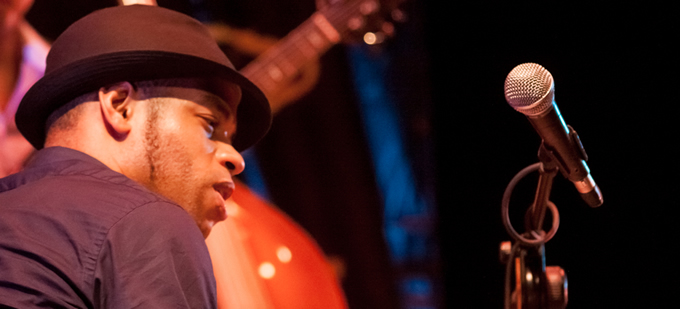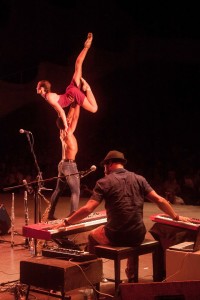
Roberto Fonseca plays Cuba
By Mónica Rivero
HAVANA – It is by now commonplace for Roberto Fonseca and Temperamento to fill the spaces where they appear. From “At the Beginning” (1999) to “Me” (2013) and thanks to systematic appearances on stage, they have built up a mass of followers who are accustomed to the musicians’ skill, ingenious creativity and ability to entertain.
Last Tuesday, at the Mella Theater in Havana, just back from an international tour, Roberto Fonseca and Temperamento made an appearance. An audience full of lovers of jazz – and, in the case of these performers, a special kind of jazz – heard a masterly concert with two special guests: El Nene, who brought his voice, and Roberto García, who gave voice to his trumpet.
To the Cuban public, this appearance involved two premieres: one, the combination of music with a performance by two dancers (in “Dance of the Spirit”); two, themes from the group’s latest project, “Traditional,” originally conceived for presentation at the prestigious Marciac Jazz Festival in France and likely to become a CD.

“This is traditional Cuban music seen from our point of view,” Fonseca explains. “We don’t want to present it as ‘the purest’ music but to add new sonorities to it and make it our version. We want to give the world our traditional music combined with electronic instruments.”
He evokes that might be considered a method of work over the years: to mix effects, roots and diverse sound trends, combined with different moments in the art of music.
On stage, Fonseca is surrounded by three keyboards, one of them a small laptop. Rhythms change in the drumsticks of Ramsés Rodríguez. Javier Zalba plays different wind instruments; Jorge Luis Valdés (Chicoy) plays various string instruments. Yandy Martínez plays the bass in multiple styles, or rather, in a style of multiplicity.
In what style does he play? “We’re going to a concert,” he usually answers. Yes, let the music speak.
Electronic elements, melody, African roots, and a strong rhythmic base form a symbiosis of musicality under the baton of Roberto, a young musician, graceful, lover of the good practice of music and a lover of Cuba, the generator of a special energy that communicates on stage to the other musicians.
“I see myself as another element of an ensemble that can do much. All of us must have the same connection, feel the same way, enjoy the same tranquility to share and go forward. The concert is nothing more that a continuation of our lives off stage,” he has said, referring to Temperamento.
A cultist of the great Cuban musicians, whom he frequently honors with his piano and his words, Fonseca has gone in the past few years from playing (as he did from an early age) in the little house he inhabited in the working neighborhood of San Miguel del Padrón to large international stages, and from anonymity to gigantic posters at the entrances of jazz cathedrals in major music festivals worldwide.
This has enabled him to treasure the teachings of old while absorbing new teachings in a consistent manner. In his opinion, “healthy talent allows us to be forever aware of the music and listen to the others, because nobody knows the absolute truth.”
Fonseca comes from a family of musicians. He first studied at the Amadeo Roldán Conservator and later went to the National School of Art. For five years, he played in the Buena Vista Social Club, enjoying a deep and satisfying relationship with Ibrahim Ferrer during a period that he describes as his third school.
He greatly appreciates the function of academia, so long as it is complemented with knowledge of popular music. He identifies the success of Cuban music thus: “We Cubans are very rhythmical and have a classical foundation. That combination is huge: we have technique and the ability to dominate rhythm.”
In the works that form the discography of Temperamento – founded by Zalba and Fonseca in 1998 – one notices the strong presence of the Afro-Cuban religion. To Fonseca, this determines the spirituality with which he surrenders to the act of composition and interprets what he himself has written.
Sitting at the piano, he often seems to be in a trance, connected with something that’s profound and sacred. Pure music? Ancestral voices? Sounds of the universe? He can’t put it in exact words.
“When I play the piano, I let myself be carried away,” he says. “It’s not easy for me to describe that. At that moment, I want to transmit something and I forget time and space. I become a bridge between spirit and matter, a channel for the music to flow through. It is almost as if I had turned into music.”
In any case, his appearance is very sincere. There is no simulation, he is not a personage preening on stage and neither is his stance on the cover of “Me,” or his natural way to relate to the public, or his reaction to the surprise he creates when people notice that an artist of his level travels through the capital in a run-down Polish FIAT.
Roberto Fonseca keeps traditional Cuban music in a kind of altar that is neither untouchable or inaccessible. His vision of that sacred music includes renewal. “Unfortunately, we have not updated its sound codes, we have allowed it to be heard only as something from the past.”
He laments the cases where the dissemination of Cuban music has concentrated on the issue of selling. Fonseca describes that situation as the use of clichés to identify Cubanness.
“Guayabera, cigars, straw hats, maraccas, and Cuban women dancing. That’s okay for a show, but if you want to make music, find other formulas to say what you represent. It would be gratifying if someday people said that someone made sure that Cuba was not just the dark women, the cigars, the rum, let’s go dance on the beach under the sun … that someone fought to make the music respectable and demonstrated that there are many ways to do that.”
Roberto Fonseca and Temperamento have worked hard to be the music’s defenders. So, he comes to us now with “Traditional,” a new point of view: a reconstruction of music already built, seen as a structure of innumerable pieces that can always be recombined. It can be played today and made to sound like yesterday.
Fonseca and Temperamento play and touch the Cuban heart as they reach out to touch the world.
Progreso Semanal/Weekly authorizes the total or partial reproduction of the articles by our journalists, so long as source and author are identified.


